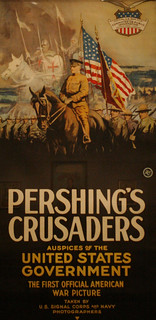Edward Bernays and the Manipulation of the Public Mind
Edward Bernays was the nephew of pioneering Austrian psychiatrist Sigmund Freud. His parents had settled in the U.S. and Bernays grew up American, but came to be deeply influenced by his uncle's ideas about the unconscious, its role as the repository of repressed sexual and aggressive impulses and its potential use as a means of manipulating the masses. Bernays was also influenced by social psychologist Wilfred Trotter's theories on crowd psychology and the "herd instinct."
During WWI, which threw Freud into a deep depression because he saw it as confirmation of his worst fears about human behavior, Bernays was working as a press agent and was asked to assist the war effort by participating in the American government's committee on public information, known as the Creel Committee. His great contribution was effectively promoting president Woodrow Wilson's narrative of the war as a fight to spread democracy to Europe. During the Paris Peace Conference, Bernays would see first-hand the success of his propaganda efforts as the Paris crowds greeted Wilson as "a liberator of the people. The man who would create a new world in which the individual would be free."
Inspired by the achievements of propaganda during wartime, Bernays, looking to make his fortune, set to work on turning Americans from citizens into passive consumers who would be controlled by channeling their unconscious desires into a constant quest for goods and services that they would associate with their deepest yearnings for beauty, freedom and fulfillment. Bernays would come up with tactics to bombard the public with messages that would cement this objective.
One of his first successes involved helping the tobacco industry expand their market by breaking the taboo against women smoking in public. After soliciting the advice of the top psychoanalyst in America who told him that cigarettes were a phallic symbol and represented male sexual power, he realized that if cigarettes could be associated with challenging men's power, women would respond positively to smoking as it would be connected to the ideas of freedom and rebellion --two of the most common marketing concepts to this day.
At the annual Easter Day Parade in New York City, Bernays staged a memorable event in which a group of "rich debutantes" lit up cigarettes in theatrical fashion at Bernays' pre-arranged signal. He had tipped off the media that a group of "suffragettes" would be lighting up what they called "torches of freedom." As Bernays knew, who could argue against freedom in America? By associating cigarettes with freedom to women, Bernays had helped the tobacco companies hit the jackpot.
Bernays and his insights soon became indispensable to corporate America, which was worried that consumer demand for their products would plateau as mass production had been mastered and people at the time tended to buy goods based on need and durability. Only a small group of wealthy people could buy a significant number of luxury items. Consequently, to continue growing their markets, they needed to "transform the way the majority of Americans thought about products" as Paul Mazen, a Leahman Brothers Wall Street banker said. Mazen turned to Bernays for implementation of this transformation.
As Peter Solomon, investment banker for Leahman Brothers, said about Bernays in the documentary film Century of the Self:
Next Page 1 | 2 | 3 | 4 | 5 | 6 | 7 | 8 | 9
(Note: You can view every article as one long page if you sign up as an Advocate Member, or higher).






